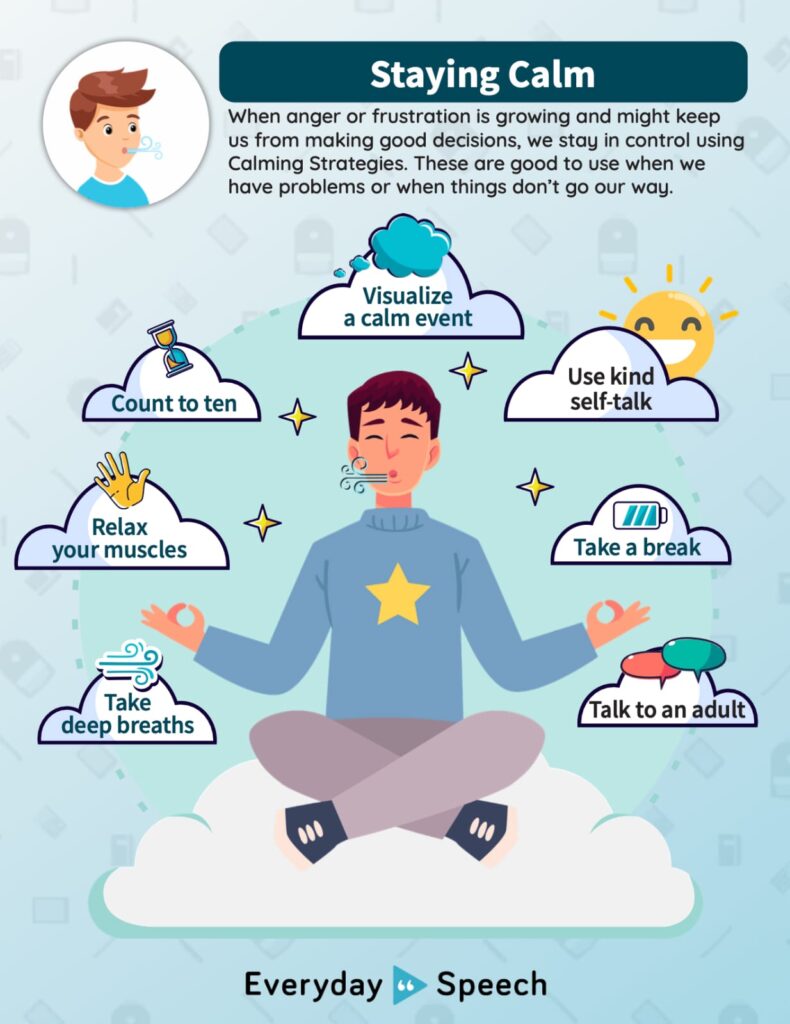The Importance of Staying Calm in Front of Others
Facing teachers, classmates, or a large crowd can be a nerve-wracking experience for many people. Whether you are asked to speak in class, give a presentation, or simply answer a question, the pressure to perform well in front of others can cause feelings of anxiety and self-doubt.
This common challenge is known as performance anxiety, and it affects people of all ages. Learning how to keep your cool during these moments is crucial—not only to help you communicate your ideas effectively but also to protect your mental and emotional well-being.
Being able to remain calm and composed in social and academic settings contributes to your self-confidence, which plays a significant role in your personal and professional growth. It also improves your public speaking skills, enabling you to engage better with your audience, whether it’s your classmates or a large crowd.
From understanding the science behind nervousness to learning breathing exercises and confidence-building strategies, you will discover actionable tips that can help transform anxiety into confidence. Whether you’re dealing with stage fright or just everyday social jitters, mastering these skills can make a noticeable difference in your life.
Understanding Why We Get Nervous
Feeling nervous or anxious in front of teachers, classmates, or crowds is a completely normal human reaction. To effectively manage these feelings, it helps to understand why they occur.
The sensation of nervousness often stems from a basic survival mechanism called the fight-or-flight response, which is triggered when our brain perceives a situation as threatening—even if that threat is just a fear of embarrassment or failure.
This leads to physical symptoms such as increased heart rate, sweating, shallow breathing, and muscle tension. These reactions can make it harder to think clearly or speak confidently when in front of others, creating a vicious cycle of anxiety.
Psychologists explain that nervousness in social or performance situations often arises from a fear of judgment or rejection. You may worry about what teachers think of your answers or how classmates perceive you, which is tied to the human desire for social acceptance.
This is especially true during adolescence and young adulthood when peer pressure can be intense, leading to social anxiety.
Another key trigger is the fear of public speaking, also known as glossophobia, which affects nearly 75% of people at some point. Whether it’s a presentation, answering a question aloud, or addressing a large crowd, this fear is linked to a fear of making mistakes or being scrutinized.
Preparing Yourself Mentally and Physically
One of the most effective ways to keep your cool in front of teachers, classmates, or crowds is to prepare both mentally and physically before the situation arises. Preparation helps reduce anxiety by making you feel more confident and in control.
Mentally, deep breathing exercises are a powerful tool for calming your nervous system. Techniques such as diaphragmatic breathing or the 4-7-8 breathing method slow down your heart rate and lower stress hormones, helping you feel grounded and focused. Practicing these regularly, even before you’re in a stressful situation, can build resilience over time.
Another mental preparation technique is visualization, which involves imagining yourself succeeding in front of your audience. This method is widely used by professional speakers and athletes to boost confidence.

The visual presents five simple steps to stay calm during conflicts, like taking deep breaths and using respectful words. It promotes listening actively and maintaining focus to manage emotions and resolve issues peacefully.
Studies show that visualizing success activates similar brain areas as actually performing the task, helping your mind get ready for the real experience. Spend a few minutes picturing yourself speaking clearly and confidently, receiving positive feedback from teachers and classmates.
Positive self-talk, or using affirmations, is another key strategy. Instead of letting negative thoughts spiral—like “I’ll mess up” or “Everyone is judging me”—replace them with encouraging statements such as, “I am prepared,” or “I can handle this.” Research supports that positive affirmations can reduce stress and improve performance.
Physical preparation also plays a vital role. Getting enough rest and sleep before facing a challenging social situation is crucial since lack of sleep can increase anxiety and impair cognitive function. According to the National Sleep Foundation, most teens and adults need between 7 to 9 hours per night for optimal functioning.
Building Confidence Over Time
Confidence is not something you are simply born with; it’s a skill that can be developed gradually through consistent practice and positive experiences. Building your confidence over time is one of the most reliable ways to stay calm in front of teachers, classmates, and crowds.
This method, known as systematic desensitization, helps reduce anxiety by retraining your brain to associate these situations with positive or neutral experiences instead of fear.
Meeting these goals builds a sense of accomplishment and encourages you to tackle bigger challenges. Goal-setting theory shows that clear, incremental goals enhance motivation and performance.
It’s also important to adopt a healthy mindset toward mistakes. Everyone makes errors, especially when learning new skills, and harsh self-judgment can increase anxiety and lower confidence.
Instead, practice self-compassion by treating yourself kindly and viewing mistakes as learning opportunities. Research by psychologist Kristin Neff highlights the power of self-compassion to improve resilience and emotional well-being.
Practical Strategies to Stay Calm in the Moment
When you find yourself in front of teachers, classmates, or crowds, it’s normal to feel your heart race or your mind go blank. However, there are several practical strategies you can use right then and there to stay calm and composed.
Techniques such as body scans or simply noticing your breath can quickly bring you back to calmness. Studies show that even brief mindfulness exercises can reduce stress and improve concentration in high-pressure situations.
Another useful technique is using grounding exercises, which anchor your awareness to the physical world and distract you from anxiety. A popular method is the “5-4-3-2-1” technique, where you identify five things you can see, four you can touch, three you can hear, two you can smell, and one you can taste.
This helps interrupt anxious spirals and focus your mind on the here and now. You can learn more about this from resources like the Anxiety and Depression Association of America.
Managing your body language is also a key part of staying calm and appearing confident. Even if you feel nervous, standing or sitting up straight, making eye contact, and smiling can send positive signals to your brain and to your audience. Research in body language and confidence shows that adopting confident postures can actually reduce feelings of anxiety.
Another trick is to use pauses and controlled speech. When nervous, people tend to speak too quickly or stumble over words. Slow down your pace, take deliberate pauses to breathe, and articulate your words clearly.
This not only helps you stay calm but also makes your communication more effective. Public speaking guides like Toastmasters emphasize the power of pauses in maintaining audience engagement and controlling nerves.
Managing Post-Performance Feelings and Learning from Experience
After facing teachers, classmates, or a crowd, it’s common to feel a mix of relief, pride, or sometimes even disappointment. How you manage these post-performance feelings can significantly impact your confidence and readiness for future challenges.
First, it’s important to practice self-reflection in a constructive way. Reflect on what went well and what could be improved, but avoid harsh self-criticism. Keeping a journal or notes can help you track your progress and recognize patterns in your performances.
Reflective practice is widely used in education and professional development to foster continuous improvement. You can explore reflective learning techniques for guidance on making this habit effective.
Remember to celebrate your successes, no matter how small. Acknowledging your achievements builds positive momentum and strengthens your self-confidence. According to research on positive psychology, focusing on strengths and accomplishments boosts motivation and well-being.
When you face setbacks or mistakes, approach them as valuable learning opportunities. Instead of dwelling on what went wrong, analyze the situation objectively to identify what you can do differently next time.
Adopting a growth mindset, a concept developed by psychologist Carol Dweck, encourages embracing challenges and learning from failure rather than fearing it. You can learn more about growth mindset strategies and how they foster resilience and confidence.
Seeking feedback from teachers, mentors, or trusted classmates is also crucial. Constructive feedback helps you gain new perspectives and practical advice for improvement. Make sure to ask for specific, actionable suggestions rather than vague criticisms. Resources like How to Give and Receive Feedback Effectively offer helpful tips to maximize the benefits of feedback.
Finally, use relaxation techniques to decompress after stressful events. Activities such as progressive muscle relaxation, light exercise, or mindfulness meditation can reduce residual anxiety and prepare you mentally for the next opportunity.
Developing Long-Term Habits for Emotional Resilience
Keeping your cool in front of teachers, classmates, and crowds isn’t just about one-off techniques—it’s about building lasting emotional resilience that helps you navigate stress and pressure over time. Developing long-term habits supports your mental well-being and prepares you to handle a variety of social and academic situations with calm confidence.

This image provides calming strategies for managing anger or frustration, such as counting to ten, using kind self-talk, and visualizing a calm event. It features a calm, meditating character surrounded by actionable steps like taking deep breaths and talking to an adult.
One of the most important habits to cultivate is regular mindfulness meditation. Practicing mindfulness daily has been scientifically proven to reduce stress, increase emotional regulation, and improve focus.
Apps like Headspace, Calm, and Insight Timer provide guided meditations that make it easy to develop a consistent practice. Research from Harvard Medical School shows mindfulness can even change brain structures linked to anxiety and self-control.
Building a strong support network is another key element of resilience. Surround yourself with friends, family, teachers, or mentors who encourage and uplift you. Studies indicate that having social support not only buffers stress but also promotes a sense of belonging and confidence.
You can find resources on how to build positive relationships and why they matter. In addition, practicing healthy lifestyle habits such as regular exercise, balanced nutrition, and adequate sleep contributes significantly to emotional well-being.
The Centers for Disease Control and Prevention (CDC) highlights how physical health is closely linked to mental health, making it easier to cope with anxiety and pressure.
Developing effective time management skills also helps reduce last-minute stress that can undermine your confidence. Using planners, setting realistic deadlines, and breaking tasks into smaller steps are strategies supported by research on academic success and stress management. These skills ensure you feel prepared rather than overwhelmed.
Finally, cultivate a mindset of continuous learning and self-compassion. Recognize that setbacks are part of growth, and treat yourself with kindness during challenging moments. Resources on self-compassion emphasize its role in building resilience and emotional health.
Seeking Support When Needed: Knowing You’re Not Alone
Sometimes, despite your best efforts, keeping your cool in front of teachers, classmates, or crowds can feel overwhelming. It’s important to recognize that you don’t have to face these challenges alone—seeking support is a sign of strength, not weakness.
Talking openly with trusted individuals such as friends, family members, or mentors can provide relief and valuable perspective. Sharing your feelings helps reduce the sense of isolation that anxiety can bring. According to the American Psychological Association (APA), social support is a key factor in managing stress and improving mental health.
Many schools and universities offer counseling services designed to help students develop coping strategies. You can explore resources on how to find school-based counseling or local mental health services.
CBT helps identify and change negative thought patterns, building more positive and realistic ways of thinking. Learn more about CBT from reputable sources like The Anxiety and Depression Association of America (ADAA).
Online communities and support groups can also be valuable, especially if you prefer anonymity or want to connect with peers facing similar challenges. Platforms such as 7 Cups and Mental Health America offer forums and peer support networks where you can share experiences and coping tips.
Embracing Growth: Turning Challenges into Opportunities
Adopting a growth mindset—the belief that your abilities can improve with effort and practice—is foundational to this approach. Psychologist Carol Dweck’s research on growth mindset reveals that individuals who see challenges as chances to grow are more resilient, persistent, and successful in their endeavors.
When you face a difficult situation, instead of focusing on potential failure or embarrassment, try to reframe it as a valuable learning experience. For example, if you stumble during a class presentation, ask yourself what lessons you can take away to improve next time. This reflection encourages self-improvement rather than self-criticism.
Additionally, celebrate progress and small victories along the way. Recognizing incremental growth helps reinforce positive behaviors and boosts your confidence. You can explore positive reinforcement techniques that encourage continued effort and perseverance.
It’s also helpful to set realistic expectations. Understand that no one is perfect, and everyone makes mistakes—even experienced public speakers and educators. Accepting imperfection reduces pressure and makes it easier to remain calm.
Another valuable strategy is to visualize success before stepping into challenging situations. Visualization techniques, supported by sports psychology research, help improve performance and reduce anxiety. Resources like Visualization for Performance explain how imagining positive outcomes can prepare your mind and body.
Finally, seek out opportunities that gradually stretch your comfort zone. Joining clubs, participating in debates, or volunteering to lead group projects can provide meaningful practice in managing nerves and building social confidence. Over time, these experiences reinforce the belief that you can handle new challenges effectively.
Frequently Asked Questions (FAQs) About Keeping Your Cool in Front of Teachers, Classmates, and Crowds
What causes nervousness when speaking in front of others?
Nervousness often stems from fear of judgment, lack of confidence, or uncertainty about the outcome. It’s a natural response to social evaluation.
How can I stop my mind from going blank during presentations?
Practicing beforehand, using notes or cue cards, and employing mindfulness techniques can help keep your mind focused and reduce blanking out.
What are some quick ways to calm anxiety before speaking?
Deep breathing, grounding exercises, and positive self-talk are effective quick techniques to manage anxiety on the spot.
How does body language affect my confidence?
Confident body language, like standing tall and making eye contact, can actually improve your internal feelings of confidence and reduce nervousness.
Is it normal to feel anxious in front of teachers or crowds?
Yes, feeling anxious is a common experience for most people, even those who are very experienced public speakers.
Can practicing meditation really help reduce social anxiety?
Yes, regular mindfulness meditation has been shown to reduce stress and improve emotional regulation, which helps manage social anxiety.
How important is preparation for staying calm?
Preparation builds confidence by familiarizing you with your material, reducing uncertainty, and lowering anxiety levels.
What should I do if I make a mistake while speaking?
Stay calm, acknowledge the mistake if necessary, and continue confidently. Most audiences are understanding and focus more on your overall message.
How can I build long-term emotional resilience?
Consistent mindfulness practice, healthy lifestyle habits, building support networks, and adopting a growth mindset all contribute to emotional resilience.
When should I seek professional help for anxiety?
If anxiety interferes significantly with your daily activities or academic performance, consulting a counselor or mental health professional is recommended.
What role does positive self-talk play in managing nerves?
Positive self-talk helps reframe negative thoughts and boosts your confidence, making it easier to stay calm and focused.
Are there apps or tools that can help with anxiety before public speaking?
Yes, apps like Headspace, Calm, and Insight Timer offer guided meditations and exercises designed to reduce anxiety and improve focus.
How can I practice managing nervousness outside of actual presentations?
Engaging in activities like joining clubs, rehearsing in front of friends, or participating in group discussions can provide helpful practice.
What’s the best way to handle unexpected questions during presentations?
Listen carefully, take a moment to think, and respond honestly. If you don’t know the answer, it’s okay to say so and offer to follow up later.
How does sleep affect my ability to stay calm and focused?
Adequate sleep is crucial for cognitive function, emotional regulation, and stress management, all of which impact your calmness.
Can visualization techniques really improve my performance?
Yes, imagining successful outcomes can prepare your mind and reduce anxiety, improving actual performance during stressful situations.
How do grounding exercises help in moments of anxiety?
Grounding exercises redirect your focus from anxious thoughts to your physical surroundings, helping to calm your nervous system.
Is it helpful to get feedback after speaking in front of others?
Absolutely, constructive feedback provides insights for improvement and helps build confidence for future situations.
How can I stay calm if I fear being judged or embarrassed?
Remind yourself that everyone makes mistakes and most people are focused on their own experience. Practice self-compassion and focus on the message rather than perfection.
What daily habits support long-term calmness and confidence?
Regular mindfulness, healthy eating, exercise, good sleep, social support, and continual learning all support lasting emotional resilience.
“The greatest weapon against stress is our ability to choose one thought over another.” — William James
– Authored by Mridu Mishra





